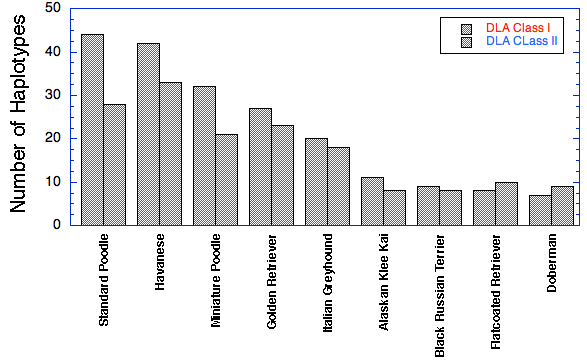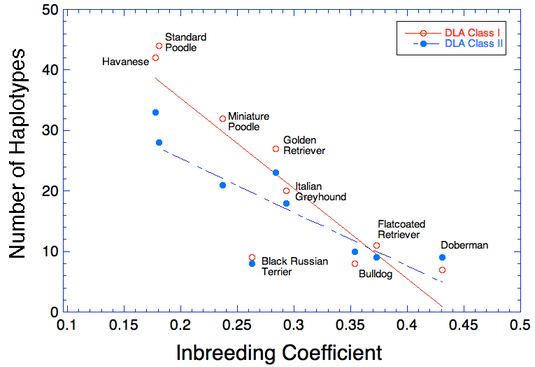We're going to talk about the relationship between the inbreeding and the immune system in dogs. Just to make sure you appreciate the complexity of your body's defense system, take a few minutes to watch this little video. You don't need to remember any of this; just notice the number of moving parts and how intricately they are connected.
No doubt about it, your body's defense system is extremely complicated, and all of its magic depends on exceptionally high diversity in the genes that run it.
(Remember, all of these variations are in the population but not in a single animal.)
When you're making breeding decisions, you probably don't think much about the genes of the immune system. But there is good evidence that inbreeding and loss of genetic diversity take a toll on DLA diversity. Breed populations with higher levels of inbreeding like the Doberman and Flatcoat have fewer DLA haplotypes, which should compromise the function of the immune system.
We know that inbreeding produces homozygosity, and this in turn increases the expression of genetic disorders caused by recessive mutations. We know also that homozygosity causes something called inbreeding depression, which is manifested as lower fertility, smaller litter sizes and higher puppy mortality, shorter lifespan, and many other detrimental effects. But inbreeding and loss of genetic diversity also affects how well the immune system does its job.
Dreger DL, M Rimbault, BW Davis, A Bhatnagar, HG Parker, & EA Ostrander. 2016. Whole genome sequence, SNP chips and pedigree structure: building demographic profiles in domestic dog breeds to optimize genetic trait mapping. Disease Models & Mechanisms 9: 1445-1460. doi: 10.1242/dmm.027037
Check out
ICB's online courses
*** BASIC POPULATION GENETICS FOR DOG BREEDERS ***
Starts 6 March 2017
*******************
Join our Facebook Group
ICB Breeding for the Future
...the science of dog breeding
*******************
Visit our Facebook Page
ICB Institute of Canine Biology
...the latest canine news and research



